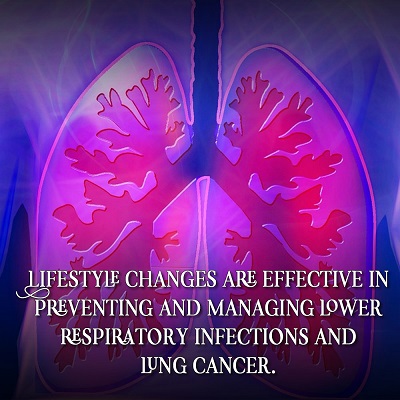 Lower respiratory infections are infections that occur anywhere from below the vocal cords to the lungs. Pneumonia, bronchitis, and tuberculosis are common LRIs, which can be dangerous, especially for children, seniors, and people with a compromised immune system. Lung cancer is one of the most fatal cancers in the world and although it begins in the lungs, it can often spread to other parts of the body.
Lower respiratory infections are infections that occur anywhere from below the vocal cords to the lungs. Pneumonia, bronchitis, and tuberculosis are common LRIs, which can be dangerous, especially for children, seniors, and people with a compromised immune system. Lung cancer is one of the most fatal cancers in the world and although it begins in the lungs, it can often spread to other parts of the body.
LRIs develop mainly due to viruses, bacteria, and fungi. Cigarette smoke, chemicals, fumes, dust, and allergen can also cause inflammation and infection. Meanwhile, the biggest risk factors for lung cancer are smoking, passive smoking, and other harmful chemicals.
Mild respiratory infections have symptoms similar to common colds, such as a runny or stuffed nose, coughing, sore throat, headache, and fever. Severe infections lead to difficulty in breathing, chest pains, wheezing, rapid breathing, and a cough that produces phlegm. With lung cancer, additional respiratory symptoms can include a small amount of blood when you cough, and a persistent cough.
Lower respiratory infections often go away with proper treatment, however, lung cancer is often not completely treatable. Treatments can help manage the symptoms and improve the quality of life.
Prevention & Management of These Conditions
Lifestyle changes are effective in preventing and managing lower respiratory infections and lung cancer. Here are some tips to help you do that:
Stop Smoking
Tobacco smoke is the leading risk factor for lung cancer. Smoking also weakens the immune system, making you prone to lower respiratory infections. It narrows the air passages, making it harder to breathe, and causes inflammation and swelling in the lungs. It destroys the lung tissues which can lead to lung cancer.
You need to quit smoking so that your body can repair itself and boost your immune system. It can also help make cancer treatments more effective and speed up your recovery.
Avoid Exposure to Air Pollutants
Prolonged exposure to air pollution, indoor pollutants, and harmful chemicals and fumes can irritate the respiratory system and damage the lungs. Test your home for radon and depending on where you live, don’t stay outdoors for too long if the air quality is poor. Make sure your air is as clean and as pure as it can be so that you can properly care for the health of your respiratory system.
Practice Good Hygiene
Wash your hands with soap and water properly. Many viruses, bacteria, and pathogens can easily stick to the hands, and as you touch your face, particularly the mouth and nose, they can infect your system. Make sure that you wash your hands with soap and water regularly, and especially take care when you have been out and about in public places.
Practice good oral hygiene too. Brush your teeth at least twice a day and visit your dentist twice a year for regular checkups. Poor oral health can lead to infections that can spread to your respiratory system.
Exercise Regularly & Eat Healthily
Get physically active by exercising five days a week. You can do 20-30 minutes a day of light to moderate exercises, such as walking. Exercise will strengthen your lungs and boost your immune system. It boosts your energy levels and improves your overall outlook on life. Everyone needs a little sunshine to boost their mood!
Dietary changes are crucial in preventing and managing lower respiratory infections and lung cancer. Make sure that you eat foods rich in essential vitamins and minerals. Proper nutrition aids in the body’s ability to repair itself naturally. A balanced and healthy diet can include fruits, vegetables, protein, healthy fats, and whole grains. Avoid processed foods with high sugar and refined carbohydrate content.
Manage Fatigue, Stress & Your Emotional Health
Give your body enough time to rest and get sufficient sleep at night. Prioritize your tasks so that you don’t overwork and practice relaxation techniques to ease your stress.
Being sick can take a toll, not only on you physically, but also mentally and emotionally. You must ensure that you take care of your mental health and address your emotional needs. Seek support from family and friends or from trained professionals, such as psychologists and therapists.
Lower respiratory infections and lung cancer can reduce the quality of your life, but with a few lifestyle changes, you can make things better for yourself.






